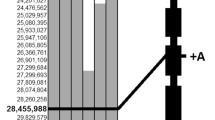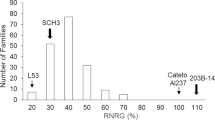Summary
The genetic relationship between acetyl-coenzyme A carboxylase (ACCase; EC 6.4.1.2.) activity and herbicide tolerance was determined for five maize (Zea mays L.) mutants regenerated from tissue cultures selected for tolerance to the ACCase-inhibiting herbicides, sethoxydim and haloxyfop. Herbicide tolerance in each mutant was inherited as a partially dominant, nuclear mutation. Allelism tests indicated that the five mutations were allelic. Three distinguishable herbicide tolerance phenotypes were differentiated among the five mutants. Seedling tolerance to herbicide treatments cosegregated with reduced inhibition of seedling leaf ACCase activity by sethoxydim and haloxyfop demonstrating that alterations of ACCase conferred herbicide tolerance. Therefore, we propose that at least three, and possible five, new alleles of the maize ACCase structural gene (Acc1) were identified based on their differential response to sethoxydim and haloxyfop. The group represented by Acc1-S1, Acc1-S2 and Acc1-S3 alleles, which had similar phenotypes, exhibited tolerance to high rates of sethoxydim and haloxyfop. The Acc1-H1 allele lacked sethoxydim tolerance but was tolerant to haloxyfop, whereas the Acc1-H2 allele had intermediate tolerance to sethoxydim but was tolerant to haloxyfop. Differences in tolerance to the two herbicides among mutants homozygous for different Acc1 alleles suggested that sites on ACCase that interact with the different herbicides do not completely overlap. These mutations in maize ACCase should prove useful in characterization of the regulatory role of ACCase in fatty acid biosynthesis and in development of herbicide-tolerant maize germplasm.
Similar content being viewed by others
References
Bradford MM (1976) A rapid and sensitive method for quantitation of microgram quantities of protein utilizing the principles of protein-dye binding. Anal Biochem 72:248–254
Burton JD, Gronwald JW, Somers DA, Connelly JA, Gengenbach BG, Wyse DL (1987) Inhibition of plant acetyl-coenzyme A carboxylase by the herbicides sethoxydim and haloxyfop. Biochem Biophys Res Comm 148:1039–1044
Burton JD, Gronwald JW, Somers DA, Gengenbach BG, Wyse DL (1989) Inhibition of corn acetyl-CoA carboxylase by cyclohexanedione and aryloxyphenoxypropionate herbicides. Pestic Biochem Physiol 34:76–85
Burton JD, Gronwald JW, Keith RA, Somers DA, Gengenbach BG, Wyse DL (1991) Kinetics of inhibition of acetyl-coenzyme A carboxylase by sethoxydim and haloxyfop. Pestic Biochem Physiol 39:100–109
Coe EH, Heuffer MG, Hoisington DA (1988) The genetics of corn. In: Sprague GF, Dudley JW (eds) Corn and corn improvement, 3rd edn. American Society of Agronomy, Madison, Wis., pp 83–236
Focke M, Lichtenthaler HK (1987) Inhibition of the acetyl-CoA carboxylase of barley chloroplasts by cycloxydim and sethoxdyim. Z Naturforsch 42:93–95
Harwood JL (1988) Fatty acid metabolism. Annu Rev Plant Physiol Plant Mol Biol 39:101–138
Marshall LC (1990) Characterization of maize genotypes tolerant to herbicides that inhibit acetyl-CoA carboxylase. Ph. D. Thesis, University of Minnesota
Mazur BJ, Falco SC (1989) The development of herbicide resistant crops. Annu Rev Plant Physiol Plant Mol Biol 40:441–470
Parker WB (1990) Selection and characterization of sethoxydim- and haloxyfop-tolerant corn (Zea mays). Ph.D. thesis, University of Minnesota
Parker WB, Marshall LC, Burton, JD, Somers DA, Wyse DL, Gronwald JW, Gengenbach BG (1990a) Dominant mutations causing alterations in acetyl-coenzyme A carboxylase confer tolerance to cyclohexanedione and aryloxyphenoxypropionate herbicides in maize. Proc Natl Acad Sci USA 87:7175–7179
Parker WB, Somers DA, Wyse DL, Keith RA, Burton JD, Gronwald JW, Gengenbach BG (1990b) Selection and characterization of sethoxydim-tolerant maize tissue cultures. Plant Physiol 92:1220–1225
Post-Beittenmiller D, Jaworski JG, Ohlrogge JB (1991) In vivo pools of free and acylated acyl carrier proteins in spinach: evidence for sites of regulation of fatty acid biosynthesis. J Biol Chem 266:1858–1865
Rendina AR, Felts JM (1988) Cyclohexanedione herbicides are selective and potent inhibitors of acetyl-CoA carboxylase from grasses. Plant Physiol 86:983–986
Rendina AF, Felts JM, Beaudoin JD, Craig-Kennard AC, Look LL, Paraskos SL, Hagenah JA (1988) Kinetic characterization, stereoselectivity and species selectivity of the inhibition of plant acetyl-CoA carboxlase by the aryloxyphenoxypropionic acid herbicides. Arch Biochem Biophys 265:219–225
Secor J, Cseke C (1988) Inhibition of acetyl-CoA carboxylase activity by haloxyfop and tralkoxydim. Plant Physiol 86:10–12
Stoltenberg DE, Gronwald JW, Wyse DL, Burton JD, Somers DA, Gengenbach BG (1989) Effect of sethoxydim and haloxyfop on acetyl-coenzyme A carboxylase activity in Festuca species. Weed Sci 37:512–516
Stumpf PK (1980) Biosynthesis of saturated and unsaturated fatty acids. In: Stumpf PK Conn EE (eds) The biochemistry of plants, vol 4. Lipids: structure and function. Academic Press, New York, pp 177–204
Author information
Authors and Affiliations
Additional information
Communicated by F. Salamini
Cooperative investigation of the Minnesota Agriculture Experiment Station and the U.S. Department of Agriculture, Agricultural Research Service. Supported in part by a grant from BASF Corporation and a University of Minnesota Doctoral Dissertation Fellowship to LCM. Minnesota Agricultural Experiment Station Publication No. 19,056
Mention of a trademark, vendor, or proprietary product does not constitute a guarantee or warranty of the product by University of Minnesota or the USDA, and does not imply its approval to the exclusion of other products or vendors that may also be suitable
Rights and permissions
About this article
Cite this article
Marshall, L.C., Somers, D.A., Dotray, P.D. et al. Allelic mutations in acetyl-coenzyme A carboxylase confer herbicide tolerance in maize. Theoret. Appl. Genetics 83, 435–442 (1992). https://doi.org/10.1007/BF00226531
Received:
Accepted:
Issue Date:
DOI: https://doi.org/10.1007/BF00226531




